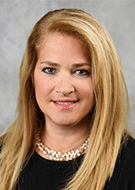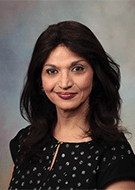RSNA 2020 Trending Topics
All virtual RSNA 2020 promises attendees a robust program full of Human Insight/Visionary Medicine



While RSNA 2020's all-virtual annual meeting may feel different than previous meetings, attendees can count on RSNA to deliver a meaningful, interactive meeting experience and world-class programming to virtual attendees across the globe.
RSNA 2020, Human Insight/Visionary Medicine, will provide a seamless experience offering interactive science and education programming and an extensive on-demand catalog with more available CME opportunities than ever before. The program, which expands on RSNA’s already successful virtual meeting, offers live Q&A for many sessions that will connect attendees with peers and colleagues of every subspecialty across the world.
To help attendees plan their schedules for this unique meeting, RSNA’s Scientific Program, Refresher Course and Education Exhibits committees chairs and subcommittee chairs offer a preview of the trends, hot topics and trailblazing research in each of the subspecialties available at RSNA 2020.
“While the format may be different, this year’s virtual meeting offers great flexibility for attendees to access a wide range of programming and learning resources,” said Zhen Jane Wang, MD, chair of the RSNA Scientific Program Committee. “Attendees can take advantage of the featured sessions, which offer opportunities to interact with abstract presenters and the chance to access a large number of on-demand sessions at their convenience throughout the week and, with Premium access, after the annual meeting.”
Innovative research continues to push the boundaries in all subspecialties, according to Dr. Wang. In particular, she noted that COVID-19 related topics are prevalent in a number of subspecialties in sessions, exhibits and research. In particular, five Hot Topic sessions update COVID-19 subjects, including non-pulmonary manifestations, neurological and neuroimaging and chest findings, as well as two sessions on radiology department readiness and workforce resilience.
In addition, attendees should look for A Comprehensive Imaging Review of COVID-19 Pneumonia with Focus on RSNA Expert Consensus, Fleischner Society Statement and ACR Recommendations: Challenges, Opportunities and Future Direction.
“Artificial intelligence (AI) remains a hot topic and there is a lot of interesting science on how AI can improve disease-specific diagnoses and how it can be integrated into clinical workflow,” Dr. Wang said. “Also of interest and great relevance to clinical practice is work presented on the validation of various classification systems and reporting systems used by many radiologists.”
Watch the video below for additional insights from Dr. Wang into RSNA 2020 scientific program content:
The education exhibits also highlight subspecialty classification and reporting systems and continue to showcase a wide breadth of innovative research that highlights major trends across all subspecialties, according to Christine O. (Cooky) Menias, MD, chair of the RSNA Education Exhibits Committee.
“In addition to research presented on various reporting systems such as LIRADS and PIRADS, many subspecialties offer exhibits on COVID-19, the unique science around e-cigarette and vaping lung damage, PET/CT and PET/MRI, AI and machine learning (ML) and 3D printing and models,” Dr. Menias said. “The exhibits this year showcase the wide variety of challenges and opportunities facing radiology, including diversity, inclusion and just culture. There are also exhibits about patient care, quality improvement, mentoring and social justice.”
Educational courses remain among the most popular and contain comprehensive content on a wide array of topics vital to clinical practice.
“Artificial intelligence remains a hot and impactful topic across the entire specialty,” said Laura Bancroft, MD, chair of the Refresher Course Committee. “Some notable practice-based courses include Impact of COVID-19 on Workforce Resilience, Mass Casualty Imaging and Workflow, Strategies to Suppress Errors and Biases in Diagnostic Radiology, and Taking Action to Promote Gender Inclusion in Radiology.”
Watch the video below from Dr. Bancroft for insights into the refresher courses at RSNA 2020:
For an overview of this past year’s most impactful research, look for the Special Interest Session, Review of 2020: New Research that Should Impact Your Practice. The two-part Friday Imaging Symposium offers a review of imaging cases in many subspecialties, including neuroradiology, breast, gastrointestinal and cardiothoracic radiology.
RSNA committees are sponsoring a number of sessions. The RSNA Committee on Diversity, Equity & Inclusion presents the Special Interest Session, Exposing Our Blindside and Overcoming Unconscious Bias. The RSNA Public Information Committee presents the Special Interest Session Improving Patient Experience through Human Design Thinking. In addition, the RSNA Professionalism Committee presents Taking Action to Promote Gender Inclusion in Radiology: A Roadmap for Progress. The RSNA Committee on Diversity, Equity & Inclusion also sponsors the Gender-based Harassment and Microaggressions session.
Click on the subspecialties below to preview the trends, hot topics and research available at RSNA 2020.
- Breast Imaging
- Cardiac Radiology
- Chest Radiology
- Emergency Radiology
- Gastrointestinal Radiology
- Genitourinary Radiology/Uroradiology
- Health Service Policy and Research/Policy and Practice
- Informatics
- Molecular Imaging
- Multisystem/Special Interest
- Musculoskeletal Radiology
- Neuroradiology
- Nuclear Medicine
- Obstetric/Gynecologic Radiology
- Pediatric Radiology
- Physics
- Radiation Oncology and Radiobiology
- Vascular/Interventional
Look for these additional program highlights in each subspecialty.
For More Information
Register for the meeting at RSNA.org/Register.
Read RSNA News stories about RSNA 2020:
RSNA Subcommittee Chairs
Information for this preview was provided by the RSNA Scientific Program, Refresher Course and Education Exhibits Subcommittee Chairs:
Scientific Program Subcommittees
Ronald S. Arellano, MD, Vascular and Interventional
Ferco H. Berger, MD, Emergency Radiology
Robert D. Boutin, MD, Musculoskeletal
Ciprian Catana, MD, PhD, Molecular Imaging
Lynn A. Fordham, MD, Pediatric Radiology
Fiona J. Gilbert, MD, Breast
Phillip J. Koo, MD, Nuclear Medicine
Jerome Z. Liang, PhD, Physics
John P. Lichtenberger III, MD, Chest
Desiree E. Morgan, MD, Gastrointestinal
Karen G. Ordovas, MD, Cardiac
Andrew B. Rosenkrantz, MD, Genitourinary
Nabile M. Safdar, MD, Radiology Informatics
Cynthia S. Santillan, MD, Health Services Policy and Research
Anna Shapiro, MD, Radiology Oncology and Radiobiology
Max Wintermark, MD, Neuroradiology
Education Exhibits Subcommittees
Samuel E. Almodovar-Reteguis, MD, Nuclear Medicine
Edson Amaro Jr, MD, PhD, Neuroradiology
Ciprian Catana, MD, PhD, Molecular Imaging
Barbaros S. Erdal, PhD, Radiology Informatics
William J. Grande, MD, Vascular/Interventional
Ambrose J. Huang, MD, Musculoskeletal
Kirti M. Kulkarni, MD, Breast
Brent P. Little, MD, Chest
Courtney C. Moreno, MD, Gastrointestinal
Mariam Moshiri, MD, Obstetrics/Gynecology
Nadeem Parkar, MD, Cardiac
Gary R. Schooler, MD, Pediatrics
William F. Sensakovic, PhD, Physics
Anna Shapiro, MD, Radiation Oncology & Radiobiology
Anup S. Shetty, MD, Multisystem/Special Interest
Scott D. Steenburg, MD, Emergency Radiology
Ashish P. Wasnik, MD, Uroradiology
Jeffrey R. Wesolowski, MD, Policy and Practice
Refresher Course Committee
Margarita L. Zuley, MD, Track Chair/Breast Imaging
Maxine S. Jochelson, MD, Track Vice Chair/Breast Imaging
Eric E. Williamson, MD, Track Chair/Cardiac
Jeremy J. Erasmus, MD, Track Chair/Chest
Ioannis Vlahos, MRCP, FRCR, Track Vice Chair/Chest
Petra J. Lewis, MBBS, Track Chair/Education
Douglas S. Katz, MD, Track Chair/Emergency Radiology
Manickam Kumaravel, MD, FRCR, Track Vice Chair/Emergency Radiology
Rathan M. Subramaniam, MD, PhD, Track Chair/Emerging Technology
Diane C. Strollo, MD, Track Chair/Essentials
Judy Yee, MD, Track Chair/GI
Matthew S. Davenport, MD, Track Chair/GU
Stephen C. O'Connor, MD, Track Chair/Hands On
Tabassum A. Kennedy, MD, Track Chair/Head & Neck
Howard P. Forman, MD, Track Chair/Health Policy & Practice
Charles E. Ray Jr, MD, PhD, Track Chair/Interventional
Ajay Gupta, MD, Track Chair/Introduction to Research
Katherine E. Maturen, MD, Track Chair/Introduction to Research
Yoshimi Anzai, MD, Track Chair/Leadership & Management
Bachir Taouli, MD, Track Chair/MR
Leon Lenchik, MD, Track Chair/Musculoskeletal
Linda Probyn, MD, Track Vice Chair/Musculoskeletal
Christopher P. Hess, MD, PhD, Track Chair/Neuro
Ajay Gupta, MD, Track Vice Chair/Neuro
Katherine A. Zukotynski, MD, PhD, Track Chair/Nuclear Medicine
Evis Sala, MD, PhD, Track Chair/Oncologic Imaging
Geetika Khanna, MD, MS, Track Chair/Pediatrics
Adina L. Alazraki, MD, Track Vice Chair/Pediatrics
Lifeng Yu, PhD, Track Chair/Physics (Diagnostic Radiology)
Jon J. Kruse, PhD, Track Chair/Physics (Radiation Oncology)
Tessa S. Cook, MD, PhD, Track Chair/Radiology Informatics
Luciano M. Prevedello, MD, MPH, Track Chair/Radiology Informatics
Christopher J. Roth, MD, Track Chair/Radiology Informatics
Mitchell E. Tublin, MD, Track Chair/Ultrasound
Vincent B. Ho, MD, MBA, Track Chair/Vascular
James M. Kofler Jr, PhD, AAPM Liaison
Ricardo Restrepo, MD, Case-based Chairman
Jorge A. Soto, MD, Case-based Director/Abdomen
Jiyon Lee, MD, Case-based Director/Breast
Diana Litmanovich, MD, Case-based Director/Cardiac
Edward Y. Lee, MD, Case-based Director/CT
Alexander R. Guimaraes, MD, PhD, Case-based Director/MR
Stacy E. Smith, MD, Case-based Director/Musculoskeletal
Amy F. Juliano, MD, Case-based Director/Neuroradiology
Katherine A. Zukotynski, MD, PhD, Case-based Director/Nuclear Medicine/PET-CT
Abbey Winant, MD, Case-based Director/Pediatric Radiology
Andetta R. Hunsaker, MD, Case-based Director/Thoracic
Deborah J. Rubens, MD, Case-based Director/Ultrasound
Sabala Mandava, MD, Associated Sciences Consortium Chairman